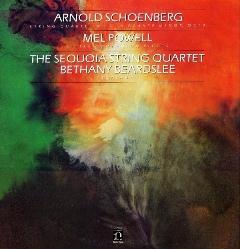Schoenberg: String Quartet Nº2 – Powell: Little Companion Pieces (1980)
Schoenberg: String Quartet Nº2 – Powell: Little Companion Pieces (1980)

Schoenberg - String Quartet No. 2 in F-sharp minor, Op. 10 1 I. Massig 6:57 2 II. Sehr Rasch 6:16 3 III. Litanie Langsam 5:38 4 IV. Entruckung 10:27 Powell - Little Companion Pieces 5 I. Night Song Invocations 3:50 6 II. Poem By William Carlos Williams 1:35 7 III. A Tamil Love Poem 1:40 8 IV. Lines 2:42 9 V. A Seri Whale Song 1:16 10 VI. Poem From James Joyce 2:47 The Sequoia String Quartet: Miwako Watanabe, Yoko Matsuda – violin James Dunham – viola Robert Martin – cello Bethany Beardslee – soprano
String Quartet No. 2 by Schoenberg. This work in four movements was written during a very emotional time in Schoenberg's life. Though it bears the dedication "to my wife", it was written during Mathilde Schoenberg's affair with their friend and neighbour, artist Richard Gerstl, in 1908. Previous dedicatees are guessed at to have been either Arnold Rosé, the founder of the Rosé Quartet (who performed Schoenberg's string quartets) or Gustav Mahler, a good friend of Schoenberg.
The third and fourth movements are quite unusual for a string quartet, as they also include a soprano singer, Marie Gutheil-Schoder, using poetry written by Stefan George. "I was inspired by poems of Stefan George, the German poet, to compose music to some of his poems and, surprisingly, without any expectation on my part, these songs showed a style quite different from everything I had written before." - Arnold Schoenberg (1937)
The first three movements are tonal, though as in his First String Quartet this is the very extended tonality of the late Romantic period. The first movement is in a compressed sonata form. The second movement, the scherzo, quotes a Viennese street-song, 'Oh du lieber Augustin' (Oh, dear Augustin). The fourth movement has no key signature, and may be considered Arnold Schoenberg's first experiment in atonality, making use of the entire chromatic gamut, though its adventurous harmony comes to a close on a haunting F sharp major chord. Its first performance was given by the Rosé Quartet and Marie Gutheil-Schoder in Vienna on December 21, 1908. The work was later revised in 1921; Schoenberg also made a version for full string orchestra.
The latter two movements of the Second String Quartet are set to poems from Stefan George's collection Der siebente Ring (The Seventh Ring), which was published in 1907. –wikipedia
The most masterly work in the canon may be Little Companion Pieces, which in 1979 ended Powell’s 10-year hiatus from composition – in that decade, he built the CalArts music school, "from the ground up," to use his own words. Like the later Settings (also from 1979) and the Strand Settings: Darker, these are miniatures of density and passion which deeply engage the listener in the poets’ world. In them are no false moves, only pure musical expression. --- Daniel Cariaga, Los Angeles Times
download (mp3 @320 kbs):
yandex 4shared mega mediafire zalivalka cloudmailru uplea








